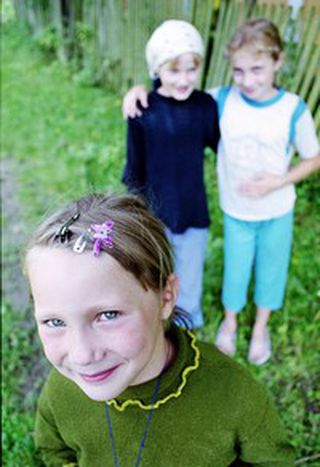
A Ukrainian grin
Published on
Translation by:
 akasemi newsome
akasemi newsome
For many Ukrainians, illicit work in the European Union is the only escape from misery. Although housekeeping work in Italy or smuggling cigarettes to Poland can bring real material gains, economic migration tears families apart.
Luba’s hearty laugh fills the taxi as it lurches towards Ukraine along the uneven asphalt road in Przemysl, Poland’s south-eastern border town. She then nods towards the passenger seat where her daughter Maria stares sadly out the window, “She fell in love while working in Poland. That’s her version of East-West rapprochement!” Like any other mother, she hopes for a brighter future for her daughters, “At home, the jobs don’t pay much. That’s why they need to get used to working abroad.”
In Vykoty, a small village in western Ukraine, people have had mixed experiences with working abroad. Men tend to do construction work in the Czech Republic or Portugal, while women head to Italy for caretaker and domestic jobs. Even with salaries often well below the minimum wage, these workers are able to take care of their families back home. The spanking new houses dotting the countryside in Vykoty are just one example of the fruits of their labour that are plain to see.
Building a home
“We worked on our house for three years and spent $20,000 per floor,” says 44-year-old Nadja. Nadja sits contentedly in a kitchen filled with fake marble surfaces that radiate a strange coolness. Both pride and mischief light her face as she talks about having a bidet installed in her bathroom, “I had to explain to some of my friends what exactly it [a bidet] was and how to use it!” Becoming homeowners was a difficult process for Nadja and her husband, Vladimir. When Ukraine won independence from Russia in the early 90s, the couple lost all their savings in a banking system collapse. “I just don’t trust banks anymore. I need to keep my money where I can see it,” she whispers, her voice betraying lingering traces of shock. Because the economic situation continued to worsen, in 1996 she first headed to Poland for work. There she held various jobs picking cherries, in construction and at a bathtub factory. When the factory was forced to close, she began to sell liquor and cigarettes. For the past six years, she has stuck with the latter profession and earns three dollars per carton of cigarettes and a dollar for every bottle of vodka sold. “The point is that I can come home every weekend to see my children and grandchildren,” says Nadja. “I could never work in Italy,” she continues adamantly, “so many families have fallen apart because someone went too far away.”
Vodka and loneliness
Vitali’s marriage is still holding together - at least on paper. He sits in his dim living-room before a glass of vodka. His brow is deeply furrowed and his glassy blue eyes reveal deep melancholy. “I am 50-years-old,” he says, “and no one here needs anyone like me.” He gestures emphatically with his thin arms and you get the idea that he wouldn’t feel especially useful in Vykoty either. “My wife has been in Italy for the past five years. That’s how long I’ve been alone,” he adds. The fact that the two are still married is unusual. Many women meet men abroad, who help them find their footing in their new country. Divorce is the next step.
Halina met her new husband in Italy. “I met Roman five days after my arrival.” She reaches over to wipe the nose of her one-year-old daughter. “We had an Orthodox wedding two years ago, he’s Ukrainian you see.” After marrying, he told her that she was really lucky to have spent so little time in Italy before meeting him. Italian men often deride Ukrainian women as whores. Halina points out, “In the meantime, I dyed my hair black. Those Italians are crazy about blondes.”
Tears for mother
Children have the biggest burdens to bear when families are torn apart. “I know children who grow up around their grandparents because both parents work abroad,” states Vykoty’s primary school librarian. Intimately familiar with their suffering she describes how "all the children started to cry when they heard a poem about a mother’s love in class.” The school director is also aware of the problem and trying to do something about it. “With offerings like extra help or art classes after school, we try and alleviate the family problems of the children.” Still, he can certainly sympathise with parents who try their luck in other countries: “Just a few years ago, I had to pay my teachers with vodka, because I couldn’t get any money from the state. Now they get at least $20 a month in cash.”
Although the work migration situation will not change anytime soon, there’s a noticeable new trend in Ukraine. After building a house, the next thing people do is get their gold teeth replaced with porcelain ones so that they can blend in with the locals abroad. So when in Ukraine, look for the dazzling white smiles and you’ll know who works overseas.
Published April 29, 2005 in the section Orient Espresso
Translated from Das weiße Lächeln der Ukraine


